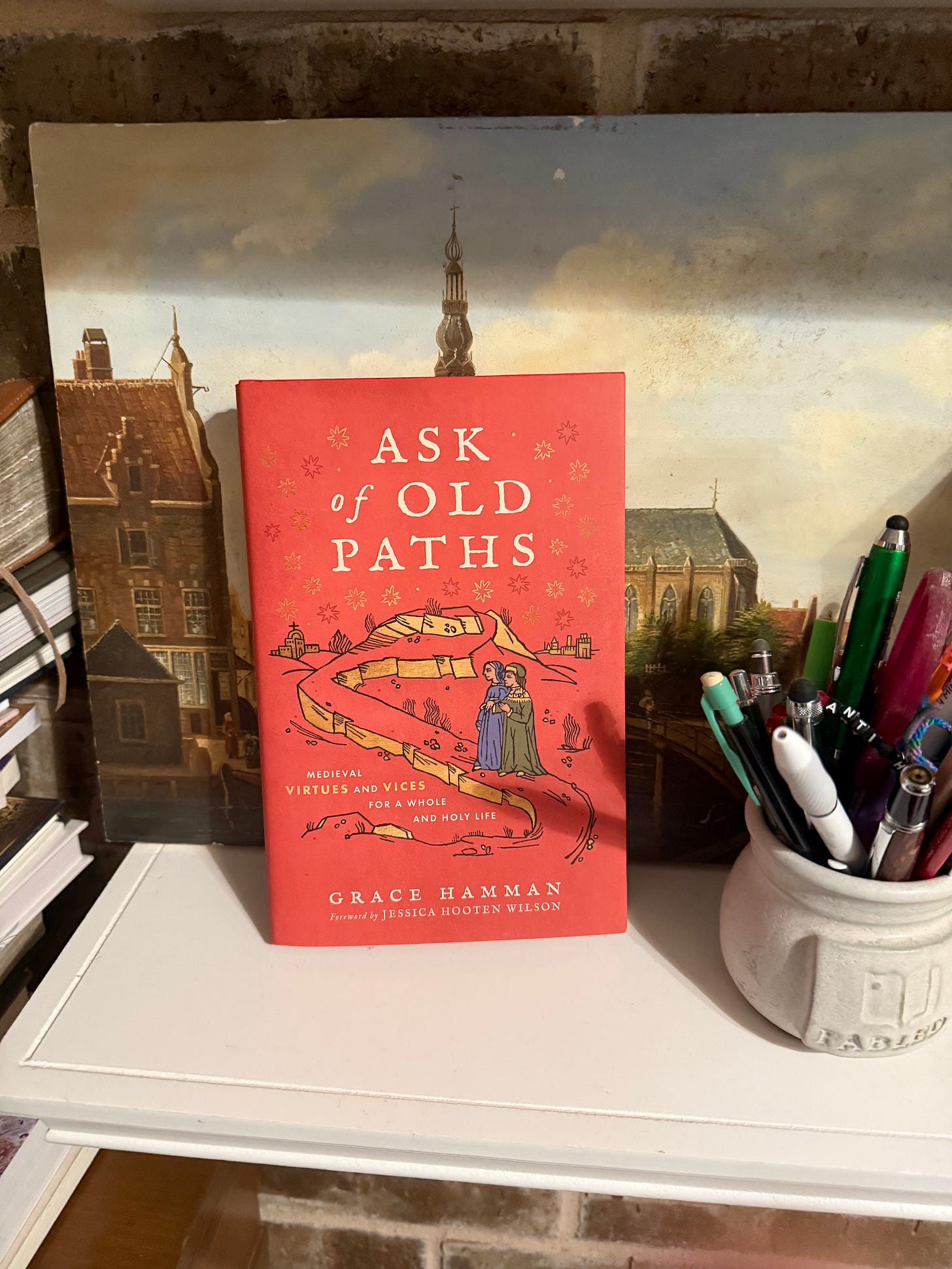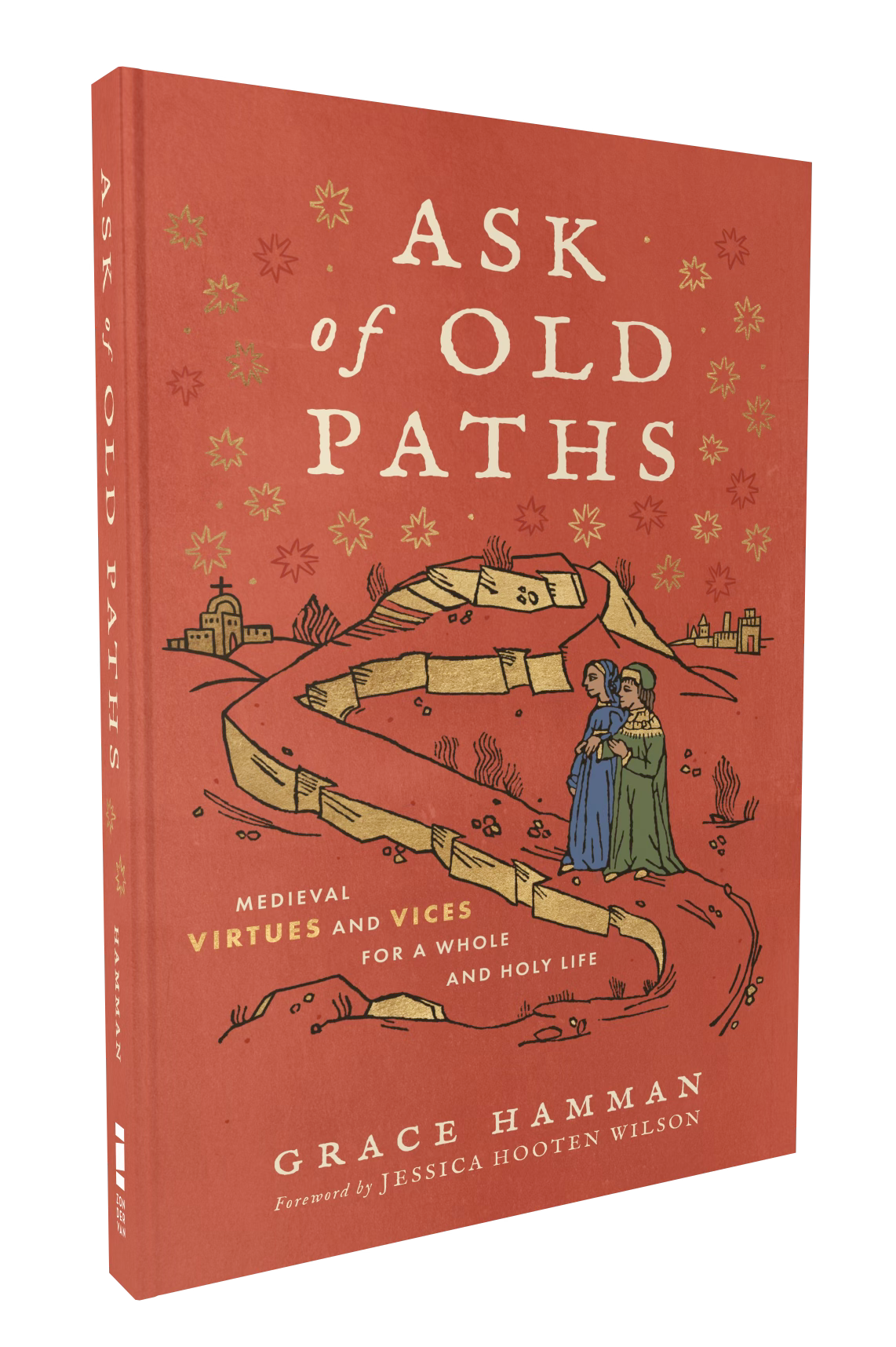Medieval Vices & Virtues for our Modern World
Grace Hamman's latest book, Ask of Old Paths, is out today, and here is an excerpt drawing from my favorite medieval priest John Mirk
It seems just last year that a medieval scholar, at the time unknown to me, reached out and asked if I would consider writing a foreword to her book. Her name was Grace Hamman. She had earned her PhD from Duke (the frenemy of my PhD school UNC-Chapel Hill), and the manuscript she sent to me was Jesus Through Medieval Eyes. I loved the manuscript and wrote the draft of a foreword while sitting on a train to Canterbury with about twenty Baylor students talking around me.
Just last week I read an early review copy of her second book, Ask of Old Paths: Medieval Virtues and Vices for a Whole and Holy Life. I immediately reached out and asked if I could feature an excerpt on Marginalia. Grace Hamman is a beautiful writer with the ability to make the medieval past not only relevant and accessible to a modern audience, but appealing, too. With this book, she offers an important theological perspective too often ignored by twenty-first century Christians; she also offers twenty-first century Christians a path to deepen our faith and move us toward sanctification. Ask of Old Paths offers hope, healing, and a glimpse into a Christian faith that is more ancient and, in some ways, more beautiful than that offered by our North American evangelical world.
Below is a description of the book from the Zondervan website as well as one of my favorite excerpts showcasing John Mirk, a fourteenth-century priest whose sermons I know by heart. Also, as someone who teaches Sunday School and leads small group, I recommend this book for book clubs and church classes.
Traditional Christian virtue and vices like abstinence, gluttony, and sloth make many of us bored or uncomfortable. At their best, these words sound dead or confusing, like incomplete fossils that belong to a distant past awkwardly enshrined in a museum. At worst, they signify a prejudiced past, when these words were wielded like weapons.
Yet in medieval writing, the language of the virtues and vices was powerful, lively, and delightfully weird. Patience is described as a peppercorn. Unicorns preach chastity. Knightly virtues fend off devious vices by throwing roses at them. In medieval books, words like avarice and meekness meant different things and carried different weight than they do today. And great medieval preachers and poets taught the virtues as crucial to what it meant to live a life of holiness, right alongside the Lord's Prayer and the Creed.
Ask of Old Paths by Grace Hamman meditates upon those strange and wonderful word-pictures and explanations of virtues and vices found in medieval traditions of poetry, sermons, and treatises long confined to dusty corners of the library. It focuses on the ancient tradition of virtue language called the Seven Capital Virtue Remedies: pride and humility, envy and love, wrath and meekness, avarice and mercy, sloth and fortitude, gluttony and abstinence, lust and chastity.
In accessible and thoughtful chapters, scholar and writer Grace Hamman shows how learning about these pairs of medieval virtues and vices can help us reevaluate our own washed out and insipid moral vocabulary in modernity. Our imaginations for the good life are expanded; our longing for sanctification sharpens. Old ideas can give us new fire in our practice of the virtue--and in that practice, we imitate Jesus and become more human.
Taken from Ask of Old Paths by Grace Hamman. Copyright Grace Hamman© (September 2025) by Zondervan. Used by permission of Zondervan, www.zondervan.com.

Illuminating, Cooking, Anointing
One of my favorite explanations of mercy comes from a popular sermon collection by the fifteenth-century cleric John Mirk [21]. Christ’s body is like an olive tree, he says. Just as an olive tree yields olives and from them olive oil, Christ freely offers mercy, his flowing blood, from his wounded body. And like mercy, oil was used for many purposes. In the ancient and medieval world, oil fueled lamps that lit the dark premodern night. Though people do not often use oil for lamps anymore, mercy still resembles that flickering light. From relief workers risking their lives in natural disasters, to volunteers writing prisoners on death row, to blood donations pouring into hospitals after a mass shooting, mercy fuels a small flame’s rebellion against the darkest moments of human violence or natural disaster. The defiant light of such mercy is what Fred Rogers famously directed us toward when he told frightened children (and adults) to “look for the helpers” in times of crisis [22].
Oil is also used in cooking. I often cover the bottom of a hot pan with olive oil, pouring in mushrooms or vegetables or meat. The oil not only flavors the whole dish, every piece of it, but ensures things do not stick. In baking, oil binds ingredients together and provides moisture, but when lightly applied to the bottom of the pan, it also allows you to share without hacking it to pieces. Oil unites and divides with ease, covering and binding and paradoxically dividing, flavoring as it goes. As in oil, so in mercy. As it covers, mercy also divides, making it easy to share one’s hard work in the pot, to give with joy. It can even flavor each action in dealing with someone difficult.
And lastly, oil was used in two highly sacred moments: to anoint monarchs at coronations and to bless the body as a soul left its earthly pilgrimage. We see the parallels between the oil of coronation and mercy in what the Summa virtutum calls the five species of mercy: to give, to lend, to pardon, to show compassion, and to correct the errors of others privately and kindly. Mercy characterizes real leadership and authority as it gives and lends without taking advantage of the power afforded by money and distinction. Mercy gently corrects and pardons, as a merciful king does, saving his people from the full force of the awful consequences of their own decisions when he can. And at last, far from the glory of kingship, mercy is the only human thing left to us in our pain as we die. Nothing material can lastingly comfort the dying in the end; only human compassion can, in the bathing of a brow, in soft words, in keeping watch.
21. John Mirk, Mirk’s Festial, ed. Theodor Erbe (Early English Text Society, 1905), 152.
22. From a television interview, “Fred Rogers: Look for the Helpers,” posted April 15, 2013.




Makes one refer back to Lewis’ appreciation of the Middle Ages and how that led him to approach the Faith in a manner that made it both lively and meaningful.
Can’t wait to read this!